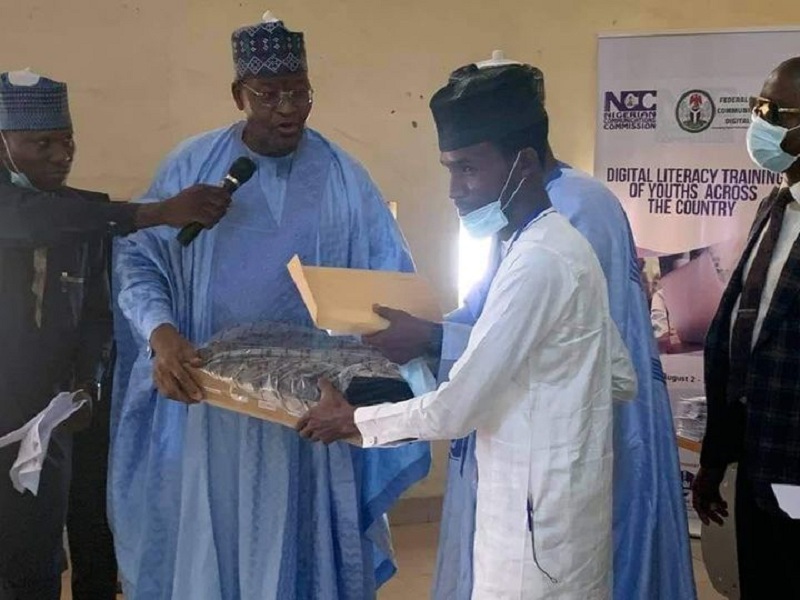Telecom
Digital Literacy Training: Danbatta Charges Nigerian Youths on Skills Application

Prof Umar Garba Danbatta, executive vice chairman of the Nigerian Communications Commission (NCC), has charged the Nigerian youths, who participated in the nationwide digital literacy training conducted by the Commission, to put the skills acquired as well as the Information and Communication Technology (ICT) tools received during the exercise to appropriate and legitimate use.

Executive Vice Chairman, NCC, Prof. Umar Garba Danbatta, presenting a certificate and laptop to a participant of Digital Literacy Training of Youths across the country at the Kano Campus of Digital Bridge Institute (DBI).
Addressing the participants at the closing ceremony of the NCC’s Digital Literacy Training for the North-West held at the Kano Campus of the Digital Bridge Institute (DBI), Danbatta, particularly enjoined the youths who have had the privilege of participating in the training to apply the skills acquired in gainful activities in order for them to be self-employed.
“The training has provided for you, useful skills, which you have acquired to earn a living for yourself without necessarily relying on government to give you a job. It is our hope at NCC that you will apply the skills appropriately and impact on your friends and associates.
“I also urge you to resist the temptations to sell the laptops and other IT tools you are going to be provided with,” Danbatta told the participants.
Speaking further, the EVC commended President Muhamamdu Buhari, the supervising Minister of Communications and Digital Economy, Dr. Isa Ali Ibrahim Pantami and the Governing Board of the Commission for the implementation of the digital capacity-building initiative, describing the scheme as an important intervention approved by the Federal Government to make more Nigerian youths self-reliant.
“We, therefore, express our profound appreciation to the President and to our Ministry for making this particular training, which is a practical demonstration of one of the important pillars of the National Digital Economy Policy and Strategy (NDEPS) 2020-2030, possible,” he pointed out.
According to the NCC boss, the Federal Government’s policy in this direction is aimed at lifting Nigerians, particularly the youths, out of poverty, stressing that to achieve this, there was a need to impact skills to the youths who will, in turn, use the skills for self-employment.
“It is consistent with this important policy of President Muhammadu Buhari that the Board of the NCC, two years ago, set up a committee of experts chaired by the former EVC of the Commission, Engr. Ernest Ndukwe, to develop modalities and syllabus for the digital training of youths across the six geo-political zones of the country,” he explained.
According to him, the implementation of the recommendations of the committee of experts, as approved by the government, gave rise to the training, which targets 1,000 Nigerian youths to be digitally trained for self-employment.
Earlier, the President of DBI, Prof. Muhammad Ajiya, who praised Prof Dabatta for his untiring efforts to ensure the implementation of the Federal Government’s policy, said the various modules of the digital, moral and leadership skills given to the youths during the course of the training will go a long way in making the beneficiaries earn a living and be self-reliant.
Participants also expressed appreciation to the Commission for the digital skills acquisition and empowerment programme.
The training, a brainchild of the Commission, which was aimed at implementing the Federal Government’s policy to lift Nigerians out of poverty, held for two weeks across each of the six geo-political zones of the country.
Across the zones, the youth were not only trained by subject-matter experts in ICT but were also given laptops, Internet Mi-Fi, financial support and certificates certifying the digital skills they have been equipped with.
Board members of the Commission participated at the closing and opening ceremonies of the training in their respective geo-political zones.
Telecom
MTN Says New N6.98 USSD Charge Won’t Affect Airtime Recharge

Lynda Saint-Nwafor, chief Enterprise business officer, MTN Nigeria, has assured the network subscribers that the new end-user billing system for the use of USSD services will jot affect them.

USSD, otherwise Unstructured Supplementary Service Data codes are commonly used for banking transactions, airtime recharges, and other mobile services.
The telco said that there is no significant impact or change other than the fact that they will now pay the same N6.98 per session (120 seconds) with their airtime instead of direct bank debit.
Saint-Nwafor, said this during a chat with MTN MIP fellows, explaining that the Central Bank of Nigeria (CBN) and the Nigerian Communications Commission (NCC) have ordered telecom operators to ensure that the new billing model resolves trust issues and ensures transparency in the billing process.
“Our regulator insisted that at the end of every month, we are going to be providing history and statistics on the performance of the service across the board”, she explained.
Saint-Nwafor added that the new billing model has standardized messaging across all operators and ensures consistent communication with customers.
“We will take all the error codes and map them into messages that are standardised across the board. So, if you initiate a transaction, you will know if it is failing. And, when the transaction fails, you will know if it is from your bank or the telco,” she explained.
Telecom
Crypto Scam Unmasked: U.S. Recovers Record $225m in Global Fraud Bust

The U.S. government has recovered $225 million in what is now the largest seizure of funds linked to a cryptocurrency investment scam.

In a statement released Wednesday, June 18, the U.S. Attorney’s Office said the recovery followed an extensive investigation by the FBI and the U.S. Secret Service, using blockchain analysis and other forensic tools. The statement did not confirm whether any arrests had been made.
According to the authorities, the stolen funds originated from fraudulent cryptocurrency investment schemes that tricked victims into believing they were making legitimate investments. More than 400 individuals around the world, including dozens in the United States, were reportedly affected.
The operation involved a sophisticated money laundering network that carried out hundreds of thousands of blockchain transactions to obscure the source and ownership of the stolen assets.
“These scams prey on trust, often resulting in extreme financial hardship for the victims,” said Shawn Bradstreet, Special Agent in Charge at the U.S. Secret Service office in San Francisco.
Bradstreet added that U.S. officials hope the recovered funds can eventually be returned to the rightful victims.
Cryptocurrency investment fraud accounted for over $5.8 billion in reported losses in 2024 alone, according to the statement.
Telecom
Nnaemeka Ani Calls on African Techies to Rewrite the Narrative

In a rousing declaration that is electrifying minds across the continent, Hon. Nnaemeka Ani, Special Adviser on ICT to Enugu State Governor, Dr. Peter Mbah, has called for a homegrown digital revolution under the banner “Africa Will Rise: By Code, By Courage, By Us.”

Hon. Nnaemeka Ani
The message, part challenge, part philosophical—seeks to galvanize African innovators to move beyond buzzwords and build technology with impact and legacy in mind.
“Let’s stop building for hype. Let’s start building for legacy,” Ani urged while speaking to ICT journalists over the weekend. “Let’s stop waiting for someone else. Let’s start creating the future—on our own terms.”
At the heart of Ani’s vision is a shift from tech consumerism to tech authorship. With innovation hubs sprouting across cities like Enugu, Lagos, Kigali, Jo’Burg, and Nairobi, and a growing community of developers, engineers, and entrepreneurs determined to solve Africa’s unique challenges, the movement is already taking shape.
Ani emphasized that Africa’s future lies not in flashy apps or international admiration but in persistent, intentional solutions that uplift communities—solutions that digitize public services, bridge rural-urban divides, empower women and youth, and build resilience in food and climate systems.
“We have the talent,” he said. “Now it’s time to harness it—to stop building for likes and start building for lasting impact.”
With support from leaders like Ani and rising momentum in Africa’s tech corridors, it seems that a new chapter is being written—one line of code at a time.

 General News3 days ago
General News3 days agoNASRDA, Galaxy Space Firm Sign MoU on Satellite Connectivity

 Telecom3 days ago
Telecom3 days agoOver 1m Nigerians Reached through MTN Staff’s Digital and Community Outreach

 Telecom3 days ago
Telecom3 days agoMafab Gets 0724 Number Series, Launches Mcom 5G Brand

 News3 days ago
News3 days agoDBN Awards N13m in Grants to Tech Startups

 Telecom3 days ago
Telecom3 days agoNCC to Name, Shame Telecom Infrastructure Vandals

 News3 days ago
News3 days agoFCCPC Shuts France, Belgium, and Italy Visa Centres in Abuja Over Alleged Consumer Rights Violations

 Telecom3 days ago
Telecom3 days agoWSIS Review: Nigerian ICT Leaders Urged to Shape Global Digital Future

 E-Financial3 days ago
E-Financial3 days agoBank Customers Petition CBN over Illegal Deductions, Demand Action





















